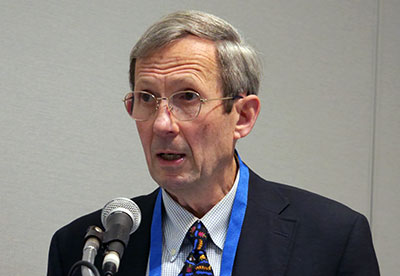Measuring Capacity in Cases of Physician-Assisted Dying: Advice to Psychiatrists

“Decisional capacity” in the context of a patient requesting physician-assisted death (PAD) is a more complex and nuanced determination than the standard assessment made by consultation-liaison psychiatrists when assessing capacity to assent to or deny standard medical treatment.
So said John Peteet, M.D., a psychiatrist in the Psycho-Oncology and Palliative Care Department of the Dana-Farber Cancer Institute, during an Annual Meeting symposium titled “Physician Aid in Dying: A Closer Look at the Psychiatrist’s Role.”
PAD is now legal in several jurisdictions. As a result, psychiatrists in these jurisdictions are increasingly being asked to assess the decisional capacity of individuals requesting PAD. Traditionally, psychiatrists use the four “Appelbaum-Grisso” criteria to determine a patient’s capacity to consent to treatment, which include the abilities to communicate a choice, to understand the relevant information, to appreciate the situation and its consequences, and to reason rationally.
But Peteet and others at the symposium argued that in the context of PAD—when a life-ending decision hangs in the balance—assessment of a patient for “capacity” requires the psychiatrist to go beyond checking off the four criteria to actively working to help expand the patient’s capacity for envisioning other options.
For one thing, Peteet said, research has shown that psychiatrists’ beliefs about how the Appelbaum-Grisso criteria should be applied in cases of PAD correlated most directly with whether or not the psychiatrist believed that PAD should be allowed. Of psychiatrists who believed PAD is never ethical, 68% stated patients with dysthymic disorder were automatically incompetent, compared with 21% of psychiatrists who believed PAD is ethical in some or all cases, Peteet said.
Moreover, quadriplegic patients in the immediate aftermath of a spinal cord injury will often express a wish for death, whereas one year later they are likely to report a high quality of life. “Perhaps in the context of PAD where a physician is deciding whether it is appropriate to offer a lethal intervention, a broader conception of what is important and allowable is needed, such as a ‘decision-optimizing’ relationship with the patient,” Peteet said. “What is at stake is not only the patient’s cognitive capacity and DSM diagnosis but the professional and clinical responsibility of the doctor to the patient.
“Even if a physician agrees that PAD is ethically permissible, he will want to see that the patient is making a fully autonomous decision before acceding to his request,” he said. “Emotional as well as cognitive elements are important to full capacity in the context of PAD as well as in decisions to withhold or withdraw life-supporting treatments. These may be implied in the ‘appreciation’ criterion of the four-part Appelbaum-Grisso standard, but to be operational needs to be better defined and recognized by those performing capacity assessments.”
Peteet was joined by Rebecca Brendel, M.D., J.D., a member of the APA Committee on Ethics and director of the master’s degree program at the Harvard Medical School Center for Bioethics, who described the legal history behind PAD and research on factors related to patients who wish for PAD. Marie Nicolini, M.D., M.Sc., a postdoctoral fellow in the Department of Bioethics at the National Institutes of Health, described the use of PAD in Belgium where the practice has been extended beyond terminal conditions to include those with mental illness; and Sonu Gaind, M.D., an associate professor of psychiatry at the University of Toronto, described the situation in Canada which is currently debating the extension of PAD to nonterminal conditions.
For related information, see the Psychiatric News series of articles on PAD:
“End-of-Life, Physician-Assisted Dying Challenge Traditional Medical Ethics”
“California Could Be Landmark for PAD in a Diverse Population”
“How Should Organized Medicine Respond to Physician-Assisted Death?”
(Image: Mark Moran)
|
|
|
|
|


